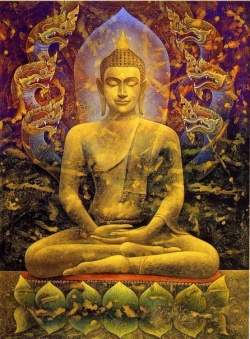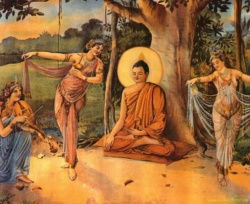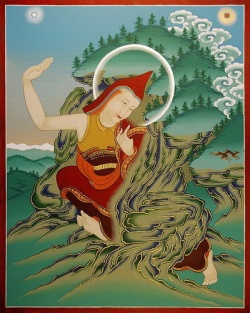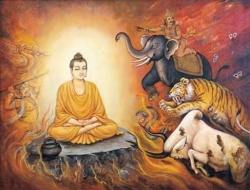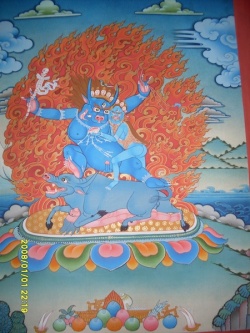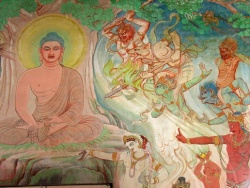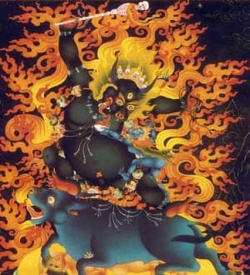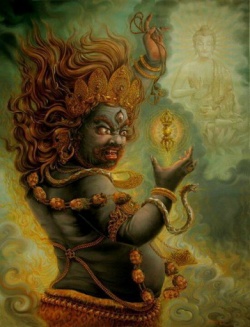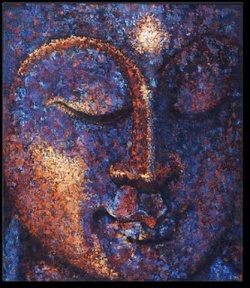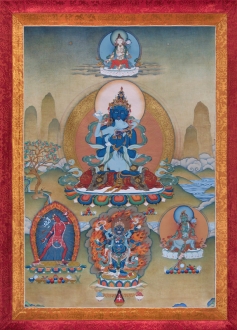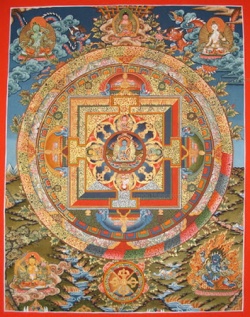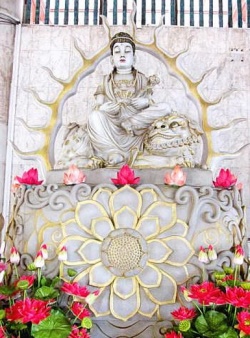What is Kamma?
The Pali term Kamma, literally, means action or doing. Any kind of intentional action whether mental, verbal, or physical is regarded as Kamma. It covers all that is included in the phrase: "Thought, word and deed".
Generally speaking, all good and bad actions constitute Kamma. In its ultimate sense Kamma means all moral and immoral volition (kusala, akusala chetana). Involuntary, unintentional or unconscious actions, though technically deeds, do not constitute Kamma, because volition, the most important factor in determining Kamma, is absent.
The Buddha says, "I declare, O Bhikkhus, that volition (cetana) is Kamma. Having willed one acts by body, speech and thought." Every volitional action of persons, except those of Buddhas and Arahants, is called Kamma. An exception is made in their case because they are delivered from both good and evil.
They have eradicated both ignorance and craving, the roots of Kamma. "Destroyed are their (germinal) seeds (khina-bija), selfish desires no longer grow," states the Ratana Sutta. This does not mean that the Buddhas and Arahants are passive.
They are tirelessly active in working for the real well-being and happiness of all. Their deeds, ordinarily accepted as good or moral, lack creative power as regards themselves. Understanding things as they truly are, they have finally shattered their cosmic fetters - the chain of cause and effect.
Some religions attributes this unevenness to Kamma, but they differ from Buddhism when they state that even unintentional actions should be regarded as Kamma.
According to them, "the unintentional murderer of his mother is a hideous criminal. The man who kills or who harasses in any way a living being without intent, is none the less guilty, just as a man who touches fire is burnt." "This astounding theory undoubtedly leads to palpable absurdities."
"The embryo and the mother would both be guilty of making each other suffer. Further the analogy of the fire is logically fallacious. For instance, a man would not be guilty if he got another person to commit the murder, for one is not burnt if one gets another to put his hand into the fire.
Moreover unintentional actions would be much worse than intentional wrong actions, for according to the comparison, a man who touches fire without knowing that it would burn is likely to be more deeply burnt than the man who knows."
In the working of Kamma its most important feature is mind. All our words and deeds are coloured by the mind or consciousness we experience at such particular moments. "When the mind is unguarded, bodily action is unguarded; speech also is unguarded: thought also is unguarded. When the mind is guarded bodily action is guarded; speech also is guarded: and thought also is guarded."
By mind the world is led, by mind is drawn: And all men own the sovereignty of mind." "If one speaks or acts with a wicked mind, pain follows one as the wheel, the hoof of draught-ox." "If one speaks or acts with a pure mind, happiness follows one as the shadow that never departs."
Immaterial mind conditions all Kammic activities
Kamma does not necessarily mean past actions. It embraces both past and present deeds. Hence, in one sense, we are the result of what we were, we will be the result of what we are. In another sense, it should be added, we are not totally the result of what we were, we will not absolutely be the result of what we are. The present is no doubt the offspring of the past and is the parent of the future, but the present is not always a true index of either the past or the future - so complex is the working of Kamma.
For instance, a criminal today may be a saint tomorrow a good person yesterday may be a vicious one today. It is this teaching of Kamma that the mother teaches her child when she says: "Be good and you will be happy and we will love you. But if you are bad, you will be unhappy and we will not love you".
Like attracts like. Good begets good. Evil begets evil. This is the law of Kamma. In short Kamma is the law of cause and effect in the ethical realm, or as some Westerners prefer to say, "action influence."
KAMMA AND VIPAKA
Kamma is action and Vipaka, fruit or result, is its reaction. Just as every object is accompanied by a shadow, even so every volitional activity is inevitably accompanied by its due effect. Like potential seed Kamma.
Fruit, arsing from the tree is the Vipaka, effect or result. As Kamma may be good or bad, so may Vipaka, fruit, be good or bad.
As Kamma is mental, so Vipaka too is mental; it is experienced as happiness or bliss, unhappiness or misery, according to the nature of the Kamma seed, Anisamsas are the concomitant prosperity, health and longevity, advantageous material conditions such as When Vipaka's concomitant material conditions are disadvantageous, they are known as Adinava (evil consequences) and appear as poverty, ugliness, disease, short life-span and the like.
By Kamma are meant the moral and immoral types of mundane consciousness (kusala, akusala lokiya citta), and by Vipaka, the resultant types of mundane consciousness (lokiya vipakacitta).
According to Abhidhamma, Kamma constitutes the twelve types of immoral consciousness, eight types of moral consciousness pertaining to the Sentient Realm (karnavacara), five types of moral consciousness pertaining to the Realms of Forms (rupavacara), and four types of moral consciousness pertaining to the Formless Realms (arupavacara).
The eight types of supramundane consciousness (lokuttara) are not regarded as Kamma, because they tend to eradicate the roots of Kamma. In them the predominant factor is wisdom (panna), while in the mundane it is volition (cetana).
The nine types of moral consciousness pertaining to the Realms of Forms and the formless realms are the five rupavacara and four arupavacara jhanas (Ecstasies) which are purely mental.
Words and deeds are caused by the first twenty types of mundane consciousness. Verbal actions are done by the mind by means of speech. Bodily actions are done by the mind through the instrument of the body. Purely mental actions have no other instrument than the mind.
These twenty-nine types of consciousness are called Kamma because they have the power to produce their due effects quite automatically, independent of any external agency.
Those types of consciousness which one experience as inevitable consequences of one's moral and immoral thoughts are called resultant consciousness pertaining to the sentient realm.
The five types of resultant consciousness pertaining to the realms of form and the four types of resultant consciousness pertaining to the formless realms are called Vipaka or fruition of Kamma.
As we sow, so we reap somewhere and sometime, in this life or in a future birth. What we reap today is what we have sown either in the present or in the past. The Samyutta Nikaya states: "According to the seed that's sown, so is the fruit ye reap therefrom Doer of good (will gather) good, doer of evil, evil (reaps) Sown is the seed, and planted well. Thou shalt enjoy the fruit thereof."
Kamma is a law in itself which operates in its own field without the intervention of any external, independent ruling agency. Inherent in Kamma is the potentiality of producing its due effect. The cause produces the effect, the effect explains the cause. The seed produces the fruit, the fruit explains the seed, such is their relationship. Even so are Kamma and its effect.
"The effect already blooms in the cause." Happiness and misery, which are the common lot of humanity, are the inevitable effects of causes. From a Buddhist standpoint they are not rewards and punishments, assigned by a supernatural omniscient ruling power to soul that has done good or evil.
Theists who attempts to explain everything by this one temporal life and an eternal future life, ignoring past, may believe in a post-mortem justice, and may regard present happiness and misery blessings and curses conferred on his creation by an omniscient and omnipotent divine ruler, who sits in heaven above controlling the destinies of the human race.
Buddhism that emphatically denies an arbitrarily created immortal soul, believes in natural law and justice which cannot be suspended by either an Almighty God, or an All-compassionate Buddha. According to this natural law, acts being their own rewards and punishments to the individual doer whether human justice finds him or not.
Some there are, who cavil thus: So you Buddhists too administer the opium of Kammic doctrine to the poor, saying: "You are born poor in this life on account of your past evil Kamma. He is born rich on account of his past good Kamma. So be satisfied with your humble lot, but do good to be rich in your next life.
"You are being oppressed now because of your past evil Kamma. That is your destiny. Be humble and bear your suffering patiently. Do good now. You can be certain of a better and happier life after death.
The Buddhist doctrine of Kamma does not expound such fatalistic views. Nor does it vindicate a post-moterm justice. The All-Merciful Buddha, who had no ulterior selfish motives, did not teach this law of Kamma to protect the rich and comfort the poor by promising illusory happiness in an after-life.
According to the Buddhist doctrine of Kamma, one is not always compelled by an iron necessity, for Kamma is neither fate nor predestination imposed upon us by some mysterious unknown power to which we must helplessly submit ourselves. It is one's own doing reacting on oneself, and so one has the power to divert the course of Kamma to some extent. How far one diverts it, depends on oneself.
THE CAUSE OF KAMMA
Ignorance (avijja) or not knowing things as they truly are, is the chief cause of Kamma. Dependent on ignorance arise Kammic activities (avijja paccaya samkhara), states the Buddha in the Patica Samuppada (Dependent Origination).
Associated with ignorance is its ally craving (tanha), the other root of Kamma. Evil actions are considered by these two causes.
All good deeds of a working (puthujjana) though associated with the three wholesome roots of generosity (alobha), goodwill (adosa) and knowledge (amoha), are nevertheless regarded as Kamma because the two roots of ignorance and craving are dormant in him.
The moral types of supramundane Path consciousness (magga citta) are not regarded as Kamma because they tend to eradicate the two root causes.
THE DOER OF KAMMA
Who is the doer of Kamma? Who reaps the fruit of Kamma? "Is it a sort of accretion about a soul?"
In answer's to these subtle questions, Venerable Buddhaghosa writes in the Visuddhi Magga: "No doer is there who does the deed, Nor is there one who feels the fruit, Constituent parts alone roll on, This indeed is right discernment.
According to Buddhism there are two realities-apparent and ultimate.
Apparent reality is ordinary conventional truth (sammuti sacca). Ultimate reality is abstract truth (paramattha sacca).
For instance, the table we see is apparent reality. In an ultimate sense the so-called table consists of forces and qualities.
For ordinary purposes a scientist would see the term water, but in the laboratory he would say H20.
In the same way for conventional purposes such terms as man woman, being, self and so forth are used. The so-called fleeting forms consist of psycho-physical phenomena which are constantly changing, not remaining for two consecutive moments the same.
Buddhists therefore do not believe in an unchanging entity, in an actor apart from action, in a perceiver apart from perception, in a conscious subject behind consciousness.
Who then is the doer of Kamma?
Who experiences the effect? Volition or will (cetana) is itself the Doer. Feeling (vedana) is itself the reaper of the fruits of action. Apart from these pure mental states (suddha-dhamma) there is none to sow and none to reap.
Just as, says the Venerable Buddhaghosa, in the case of those elements of matter that go under the name of tree, as soon as at any point the fruit springs up, it is then said "the tree bears fruit", or 'thus the tree has fruitified", so also in the case of 'aggregates (khandhas) which go under the name of deva or man, when a fruition of happiness or misery springs up at any point, then it is said "that deva or man is happy or miserable".
In this respect Buddhists agree with Prof. William James when, unlike descartes, he asserts: "Thoughts themselves are the thinkers".
WHERE IS KAMMA
"Where, Venerable Sir, is Kamma?" King Milinda questioned the Venerable Nagasena. "O Maharaja," replied the Venerable Nagasena, "Kamma is not said to be stored some where in this fleeting consciousness or in another part of the body.
But dependent on mind and matter it rests manifesting itself at the opportune moment, just as mangoes are not said to be stored somewhere in the mango tree, but dependent on the mango tree they lie, springing up in the due season."
Neither wind nor fire is stored in any particular place, nor is Kamma stored anywhere, within or without the body.
Kamma is an individual force, and is transmitted from one existence to another. It plays the principle part in the molding character and explains the marvelous phenomena of genius, infant prodigies, and so forth. The clear understanding of this teaching is essential for the welfare of the world.
Kamma is an impersonal, natural law that operates in accordance with our actions. It is a law in itself and does not have any lawgiver. Kamma operates in its own field without the intervention of an external, independent, ruling agent.
Kamma or karma can be put in the simple language of the child: do good and good will come to you, now, and hereafter. Do bad and bad will come to you, now, and hereafter.
In the language of the harvest, kamma can be explained in this way: if you sow good seeds, you will reap a good harvest. If you sow bad seeds, you will reap a bad harvest.
In the language of science, kamma is called the law of cause and effect: every cause has an effect. Another name for this is the law of moral causation. Moral causation works in the moral realm just as the physical law of action and reaction works in the physical realm.
In the Dhammapada, kamma is explained in this manner: the mind is the chief (forerunner) of all good and bad states. If you speak or act with a good or bad mind, then happiness or unhappiness follows you just as the wheel follows the hoof of the ox or like your shadow which never leaves you.
Kamma is simply action. Within animate organisms there is a power or force which is given different names such as instinctive tendencies, consciousness, etc. This innate propensity forces every conscious being to move. He moves mentally or physically. His motion is action. The repetition of actions is habit and habit becomes his character. In Buddhism, this process is called kamma.
In its ultimate sense, kamma means both good and bad, mental action or volition. 'Kamma is volition,' says the Buddha. Thus kamma is not an entity but a process, action, energy and force. Some interpret this force as 'action-influence'. It is our own doings reacting on ourselves. The pain and happiness man experiences are the result of his own deeds, words and thoughts reacting on themselves. Our deeds, words and thoughts produce our prosperity and failure, our happiness and misery.
Kamma is an impersonal, natural law that operates strictly in accordance with our actions. It is law in itself and does not have any lawgiver. Kamma operates in its own field without the intervention of an external, independent ruling agency.
Since there is no hidden agent directing or administering rewards and punishments, Buddhists do not rely on prayer to some supernatural forces to influence karmic results. According to the Buddha, kamma is neither predestination nor some sort of determinism imposed on us by some mysterious, unknown powers or forces to which we must helplessly submit ourselves.
Buddhists believe that man will reap what he has sown; we are the result of what we were, and we will be the result of what we are. In other words, man is not one who will absolutely remain to be what he was, and he will not continue to remain as what he is. This simply means that kamma is not complete determinism.
The Buddha pointed out that if everything is determined, then there would be no free will and no moral or spiritual life. We would merely be the slaves of our past.
On the other hand, if everything is undetermined, then there can be no cultivation of moral and spiritual growth. Therefore, the Buddha accepted neither strict determinism nor strict undeterminism.
Misconceptions regarding Kamma
The misinterpretation or irrational views on kamma are stated in the Anguttara Nikaya which suggests that the wise will investigate and abandon the following views:
- the belief that everything is a result of acts in previous lives; - the belief that all is the result of creation by a Supreme Ruler; and - the belief that everything arises without reason or cause.
If a person becomes a murderer, a thief, or an adulterer, and, if his actions are due to past actions, or caused by creation of a Supreme Ruler, or if that happened by mere chance, then this person would not be held responsible for his evil action.
Yet another misconception about kamma is that it operates only for certain people according to their faiths. But the fate of a man in his next life does not in the least depend on what particular religion he chooses. Whatever may be his religion, man's fate depends entirely on his deeds by body, speech and thought. It does not matter what religious label he himself holds, he is bound to be happy world in his next life so long as he does good deeds and leads an unblemished life.
He is bound to be born to lead a wretched life if he commits evil and harbors wicked thoughts in his mind. Therefore, Buddhists do not proclaim that they are the only blessed people who can go to heaven after their death.
Whatever the religion he professes, man's kammic thought alone determines his own destiny both in this life and in the next. The teaching of kamma does not indicate a post-mortem justice. The Buddha did not teach this law of kamma to protect the rich and to comfort the poor by promising illusory happiness in an after life.
According to Buddhism kamma explains the inequalities that exist among mankind. These inequalities are due not only to heredity, environment and nature but also to kamma or the results of our own actions. Indeed kamma is one of the factors which are responsible for the success and the failure of our life.
Since kamma is an invisible force, we cannot see it working with our physical eyes. To understand how kamma works, we can compare it to seeds: the results of kamma are stored in the subconscious mind in the same way as the leaves, flowers, fruits and trunk of a tree are stored in its seed. Under favorable conditions, the fruits of kamma will be produced just as with moisture and light, the leaves and trunk of a tree will sprout from its tiny seed.
The working of kamma can also be compared to a bank account: a person who is virtuous, charitable and benevolent in his present life is like a person who is adding to his good kamma. This accrued good kamma can be used by him to ensure a trouble-free life. But he must replace what he takes or else one day his account will be exhausted and he will be bankrupt.
Then whom will he be able to blame for his miserable state? He can blame neither others nor fate. He alone is responsible. Thus a good Buddhist cannot be an escapist. He has to face life as it is and not run away from it. The kammic force cannot be controlled by inactivity. Vigorous activity for good is indispensable for one's own happiness. Escapism is the resort of the weak, and an escapist cannot escape the effects of the kammic law.
The Buddha says, 'There is no place to hide in order to escape from kammic results.' (Dhammapada 127).
Our Own Experience
To understand the law of kamma is to realize that we ourselves are responsible for our own happiness and our own misery. We are the architects of our kamma. Buddhism explains that man has every possibility to mold his own kamma and thereby influence the direction of his life. On the other hand, a man is not a complete prisoner of his own actions; he is not a slave of his kamma. Nor is man a mere machine that automatically release instinctive forces that enslave him. Nor is man a mere product of nature.
Man has within himself the strength and the ability to change his kamma. His mind is mightier than his kamma and so the law of kamma can be made to serve him. Man does not have to give up his hope and effort in order to surrender himself to his own kammic force.
To off-set the reaction of his bad kamma that he has accumulated previously, he has to do more meritorious deeds and to purify his mind rather than by praying, worshiping, performing rites or torturing his physical body in order to overcome his kammic effects. Therefore, man can overcome the effect of his evil deeds if he acts wisely by leading noble life.
Man must use the material with which he is endowed to promote his ideal. The cards in the game of life are within us. We do not select them. They are traced to our past kamma; but we can call as we please, do what suits us and as we play, we either gain or lose.
Kamma is equated to the action of men. This action also creates some karmic results. But each and every action carried out without any purposeful intention, cannot become a Kusala-Kamma (skillful action) or Akusala-Kamma (unskillful action). That is why the Buddha interprets kamma as volitional activities. That means, whatever good and bad deeds we commit ourselves without any purposeful intention, are not strong enough to be carried forward to our next life.
However, ignorance of the nature of the good and bad effect of the kamma is not an excuse to justify or avoid the karmic results if they were committed intentionally. A small child or an ignorant man may commit many evil deeds. Since they commit such deeds with intention to harm or injure, it is difficult to say that they are free from the karmic results. If that child touches a burning iron-rod the heat element does not spare the child without burning his fingers. The karmic energy also works exactly in the same manner. Karmic energy is unbiased, it is like energy of gravity.
The radical transformations in the characters of Angulimala and Asoka illustrate man's potential to gain control over his kammic force.
Angulimala was a highway robber who murdered more than a thousand of his fellow men. Can we judge him by his external actions? For within his lifetime, he became an Arahanta and thus redeemed his past misdeeds.
Asoka, the Indian Emperor, killed thousands and thousands to fight his wars and to expand his empire. Yet after winning the battle, he completely reformed himself and changed his career to such an extent that today, 'Amidst the tens of thousands of names of monarchs that crowd the columns of history, their majesties and royal highness-es and the like, the name of Asoka shines and shines almost alone, as a star,' says a well-known world historian H.G. Well.
Other Factors Which Support Kamma
Although Buddhism says that man can eventually control his karmic force, it does not state that everything is due to kamma. Buddhism does not ignore the role played by other forces of nature. According to Buddhism there are five orders or processes of natural laws (niyama) which operate in the physical and mental worlds:
- seasonal laws (utu niyama): physical inorganic order e.g., seasonal phenomena of winds and rains, etc. - the biological laws (bija niyama): relating to seasonal changes etc., - the kammic law (kamma niyama): relating to moral causation or the order of act and result, - natural phenomena (dhamma niyama): relating to electrical forces, movement of tides etc., and - psychological laws (citta niyama): which govern the processes of consciousness.
Thus kamma is considered only as one of the five natural laws that account for the diversity in this world.
Can Kamma Be Changed?
Kamma is often influenced by circumstances: beneficent and malevolent forces act to counter and to support this self-operating law. These other forces that either aid or hinder this kamma are birth, time or conditions, appearances, and effort.
A favorable birth (gati sampatti) or an unfavorable birth (vipatti) can develop or hinder the fruition of kamma. For instance, if a person is born to a noble family or in a state of happiness, his fortunate birth will provide an easy opportunity for his good kamma to operate. An unintelligent person who, by some good kamma, is born in a royal family, will, on account of his noble parentage be honored by the people. If the same person were to have a less fortunate birth, he would not be similarly treated.
Good appearance (upadhi sampatti) and poor appearance (upadhi vipatti)are two other factors that hinder or favor the working of kamma. If by some good kamma, a person obtains a good birth, but is born deformed by some bad kamma, then he will not be able to fully enjoy the beneficial results of his good kamma. Even a legitimate heir to a throne may not perhaps be raised to that high position if he happens to be physically or mentally deformed. Beauty, on the other hand, will be an asset to the possessor. A good-looking son of poor parents may attract the attention of others and may be able to distinguish himself through their influence. Also, we can find cases of people from poor, obscure family backgrounds who rise to fame and popularity as film actors or actresses or beauty queens.
Time and occasion are other factors that influence the working of kamma. In the time of famine or during the time of war, all people without exception are forced to suffer the same fate. Here the unfavorable conditions open up possibilities for evil kamma to operate. The favorable conditions, on the other hand, will prevent the operation of bad kamma.
Effort or intelligence is perhaps the most important of all the factors that affect the working of kamma. Without effort, both worldly and spiritual progress is impossible. If a person makes no effort to cure himself of a disease or to save himself from his difficulties, or to strive with diligence for his progress, then his evil kamma will find a suitable opportunity to produce its due effects.
However, if he endeavours to surmount his difficulties, his good kamma will come to help him. When shipwrecked in a deep sea, the Bodhisatta during one of his previous births, made an effort to save himself and his old mother, while the others prayed to the gods and left their fate in the hands of these gods. The result was that the Bodhisatta escaped while the others were drowned.
Thus the working of kamma is aided or obstructed by birth, beauty and ugliness, time and personal effort or intelligence. However, man can overcome immediate karmic effects by adopting certain methods. Yet, he is not free from such karmic effects if he remains within this Samsara cycle of birth and death. Whenever opportunities arise the same karmic effects that he overcame, can affect him again. This is the uncertainty of worldly life. Even the Buddha and Arahantas were affected by certain kammas, although they were in their final birth.
The time factor is another important aspect of the karmic energy for people to experience the good and bad effects. People experience certain karmic effects only within this lifetime while certain karmic effects become effective immediately hereafter the next birth. And certain other karmic effects follow the doers as long as they remain in this wheel of existence until they stop their rebirth after attaining Nibbana. The main reason for this difference is owing to mental impulsion (Javana Citta) of the people at the time when a thought arises in the mind to do good or bad.
Impartial Energy
Those who do not believe that there is an energy known as kamma should understand that this karmic energy is not a by-product of any particular religion although Hinduism, Buddhism and Jainism acknowledge and explain the nature of this energy. This is an existing universal law which has no religious label. All those who violate this law, have to face the consequences irrespective of their religious beliefs, and those who live in accordance with this law experience peace and happiness in their life. Therefore, this karmic law is unbiased to each and every person, whether they believe it or not; whether, they have a religion or not. It is like any other existing universal law. Please remember that kamma is not the exclusive property of Buddhism.
If we understand kamma as a force or a form of energy, then we can discern no beginning. To ask where is the beginning of kamma is like asking where is the beginning of electricity. Kamma like electricity does not begin. It comes into being under certain conditions. Conventionally we say that the origin of kamma is volition but this is as much conventional as saying that the origin of a river is a mountain top.
Like the waves of the ocean that flow into one another , one unit of consciousness flows into another and this merging of one thought consciousness into another is called the working of karma. In short, every living being, according to Buddhism, is an electricity current of life that operates on the automatic switch of kamma.
Kamma being a form of energy is not found anywhere in this fleeting consciousness or body. Just as mangoes are not stored anywhere in the mango tree but, dependent on certain conditions, they spring into being, so does kamma. Kamma is like wind or fire. It is not stored up anywhere in the Universe but comes into being under certain conditions.
